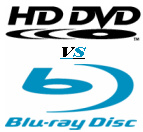 According to patent discovered by New Scientist, Warner has been brainstorming on the possibility of a hybrid disc that could store HD DVD and Blu-Ray data on one side and DVD data on the other (possibly also CD data). The only hybrid discs that have been produced so far are HD DVD / DVD discs. While the manufacturing processes of HD DVD and DVD are similar, Blu-ray requires new equipment to produce.
According to patent discovered by New Scientist, Warner has been brainstorming on the possibility of a hybrid disc that could store HD DVD and Blu-Ray data on one side and DVD data on the other (possibly also CD data). The only hybrid discs that have been produced so far are HD DVD / DVD discs. While the manufacturing processes of HD DVD and DVD are similar, Blu-ray requires new equipment to produce.
This is made possible by the use of semireflective coatings to allow the two layers to coexist on a single side. The Blu-ray data layer would work like a two-way mirror in that it would reflect enough light for Blu-ray playback, but would also let enough light through for HD DVD playback. The greater depth of HD DVD's data layer makes this possible.
A DVD disc, like HD DVD, has a data layer at 0.6mm but uses a red laser at 650nm. For DVD data to also be stored on the same disc it would have to be on the opposite side of the Blu-ray / HD DVD side. Obviously such a disc would cost more to produce than a standard HD disc (while also putting aside legal complications and otherwise) but it could possibly make the DVD format war easier for the average confused consumer.
Of course, there are downsides to this method. The main downside would be that each HD format would only have one layer on the disc, that's 25GB Blu-ray data and 15GB HD DVD. Then when you consider the capacity that HD content demands, studios would find themselves having to release some movie titles with multiple discs just like DVD. Besides a hybrid disc option, another possibility is a player that can read both formats. Technology that could bring these players to the market has already been demonstrated.
Source:
New Scientist













